Syria war: From besieged Madaya, desperate calls for help
- Published
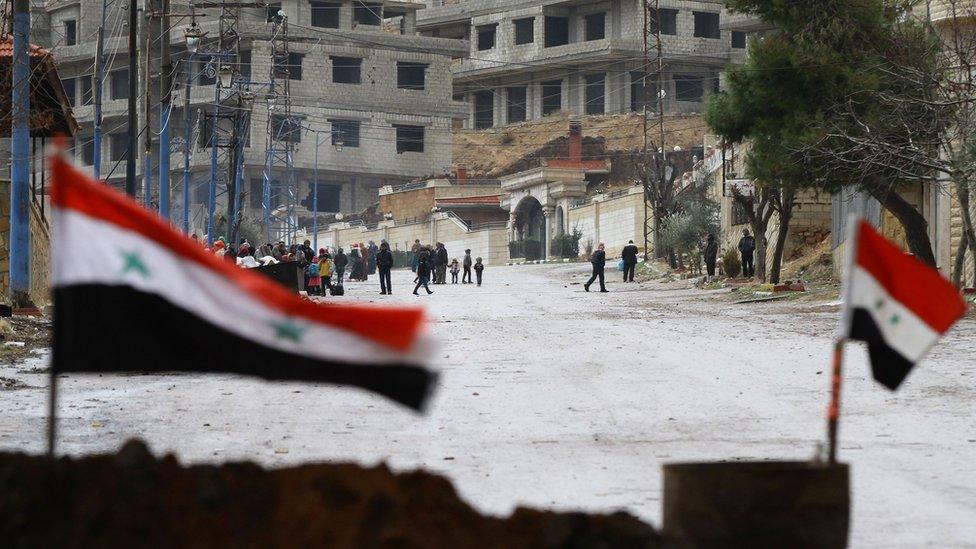
Madaya has been besieged by Syrian forces and their allies since June 2015
Mohamed al-Maleh was playing on the rooftop of a building in the Syrian town of Madaya when, his father said, a sniper shot him. The 12-year-old boy fell, severely injuring his head.
Moussa al-Maleh rushed to get him treated. "He was a happy boy, but wasn't having a life of a normal child," he said, recalling Mohamed's routine living under government siege.
"On the days of shelling, he would go to the basement with us. He would spend days without having anything to eat. There was no entertainment. He was living 1% of what normal children live."
The clinic Mohamed was sent to was, in fact, just a room in the basement of a house. Run by Mohammed Darwish, a 26-year-old dentistry student, a dentist and a veterinarian, this was the only medical facility in Madaya.
"We try to do the best we can, but we can't treat patients completely. We are not specialists," Mr Darwish said. "But we have to keep it up. We have no choice. It's a gift from Allah to us to treat people."
To save the boy, they would have to transfer him elsewhere. "It was a hard feeling, a shock, like 'What do we do now?' He needed surgery, a hospital, he was bleeding. We stopped and watched him."
'Like animals'
But Madaya, a town of 40,000 in the mountains 25km (15 miles) north-west of Damascus, has been under siege since June 2015, surrounded by the Syrian army and allied fighters from Lebanon's Hezbollah group, who are supported by Iran.
Movement in and out of the town is tightly controlled, and calls for the boy's evacuation were ignored. Eighteen hours later, he died. "We have been left here like animals," his father said.
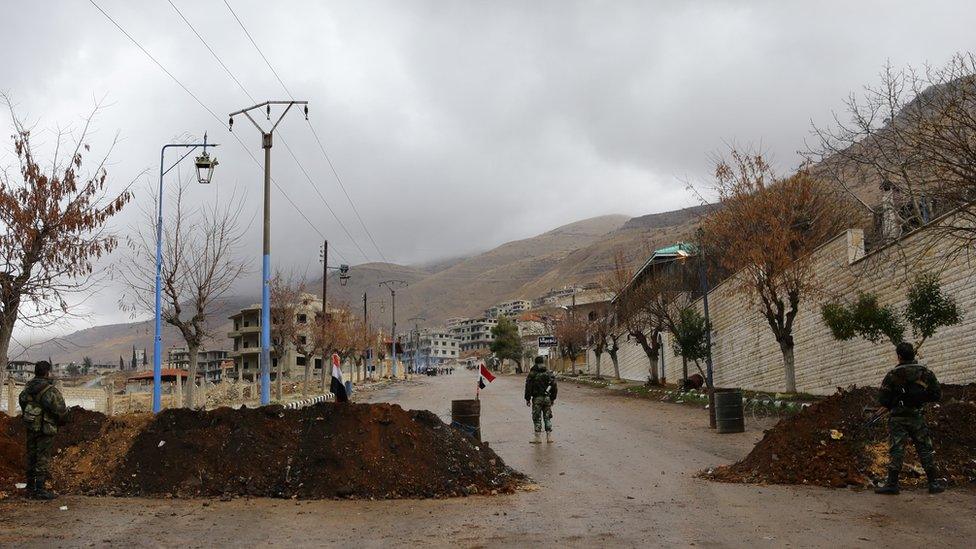
Residents say Syrian pro-government forces prevent the sick and wounded from leaving Madaya
Days earlier, Mr Darwish said, Mohamed Almoeel was outside his house when he was hit in the abdomen, also by a sniper. Residents say snipers have been active there, shooting at those who venture outside, killing many on the spot. Even mourners at funerals are said to have been targeted.
The crew at the clinic tried, again, to get the patient out but, according to Mr Darwish, government-allied fighters would not allow them to leave.
The only option left was to operate on him there. "We had no specialist, no anaesthetics. We had to do it, but we didn't know how. So we asked doctors on Whatsapp," he said.
Whatsapp groups and Skype networks have been set up by specialists and NGOs inside and outside Syria, in an effort to help medical workers in makeshift clinics like the one in Madaya.
The surgeon helping Mohammed Darwish via Whatsapp was in Idlib, a rebel-held city in northern Syria, one of the few remaining strongholds of the opposition. That is where thousands of civilians and fighters evacuated from eastern Aleppo are being taken to.
But Idlib itself is now under immense pressure, aid groups say, unable to treat people suffering from chronic diseases and war injuries, including amputated limbs and head wounds.
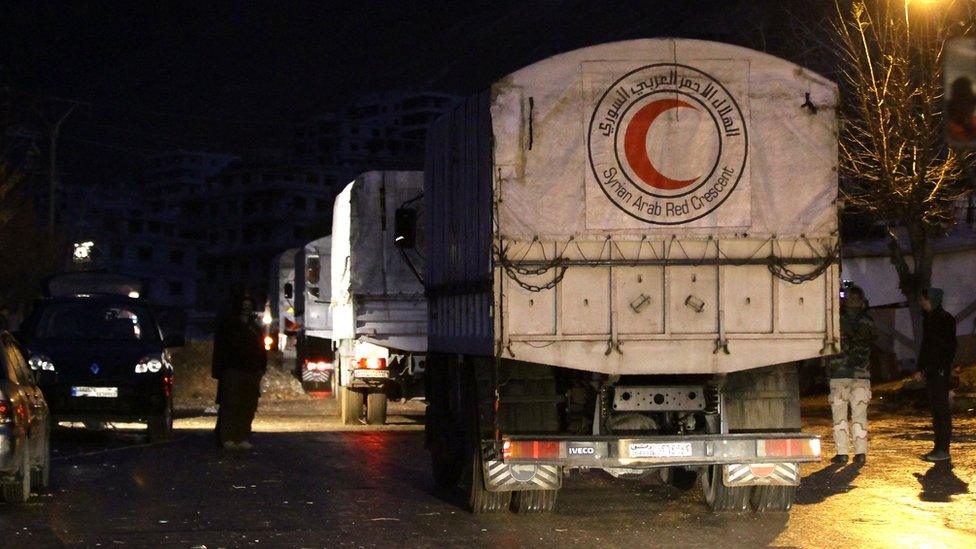
Aid convoys have been given little access to Madaya
It took Mr Darwish and his colleagues eight hours to operate on Almoeel. "The doctors guided us how to do it. During the operation we took pictures of his abdomen, left the room and asked the doctors what to do," he said.
"The bullet caused a lot of damage inside his body. We did all we could. But he needed a specialist. We couldn't stop the bleeding. So we closed the abdomen and watched him."
When morning came, Almoeel died.
The sick kept coming in but, in many cases, there was little that Mr Darwish and his team could do.
'Starving to death'
The siege on Madaya has blocked the city's access to medicine, fuel and food.
Residents have nowhere to go, as roads are blocked and landmines encircle the town. According to Siege Watch, a group which monitors conditions in blockaded areas, very little is able to enter, and locals are dependent on infrequent humanitarian convoys.
The United Nations said earlier this year there were credible reports of people dying of starvation, external there. Children, UN staff were told, were collecting grass with which to make soup. Outrage followed, and humanitarian groups were allowed access between January and April. They returned only in September, and said malnutrition remained a serious issue.
In November, at least four children died of malnutrition-related cases, Siege Watch said. At the end of that month, aid was finally allowed in again.
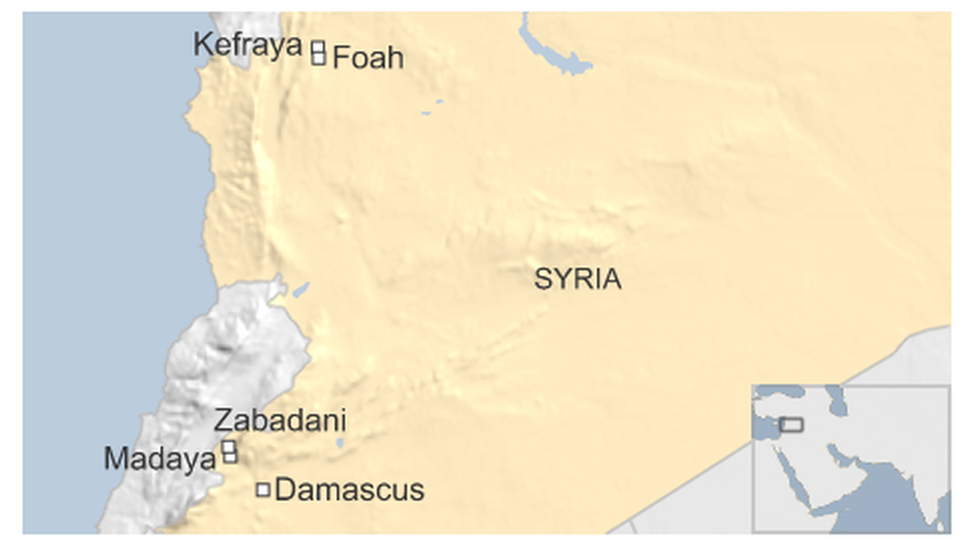
The lack of vitamins had also increased the number of miscarriages, Mirna Yacoub, deputy representative for the UN's children's charity Unicef in Syria told the BBC in October. Caesareans were also more common because of the poor health of women, some so weak that they could not go through normal labour.
Moussa was still mourning the loss of his son when, seven days later, he returned to Mohammed Darwish's clinic, this time with his wife, who was pregnant with their second boy. "She had high pressure and was very weak. So we prepared her for surgery. When the baby came out, he was dead. We were shocked," Mr Darwish said.
The news devastated the family. "My wife is diabetic. She has lost part of her sight," Moussa said. "She can only cry now and say: 'Why do they want to kill our children?' She feels as if she has lost one of her organs."
When Ms Yacoub visited the clinic, she was surprised to see that C-sections were being performed there. They had grown so desperate that, lacking alcohol to sanitise equipment, tools were being sterilised using flames. With no medical gel for ultrasounds, hair gel was being used instead.
"We're so tired," Mr Darwish said in one of many interviews since October. "Patients often come here and we don't know what to do. There are no specialists, no drugs, no alternative. The only thing we can do is hear them. I hate that I can't treat them."
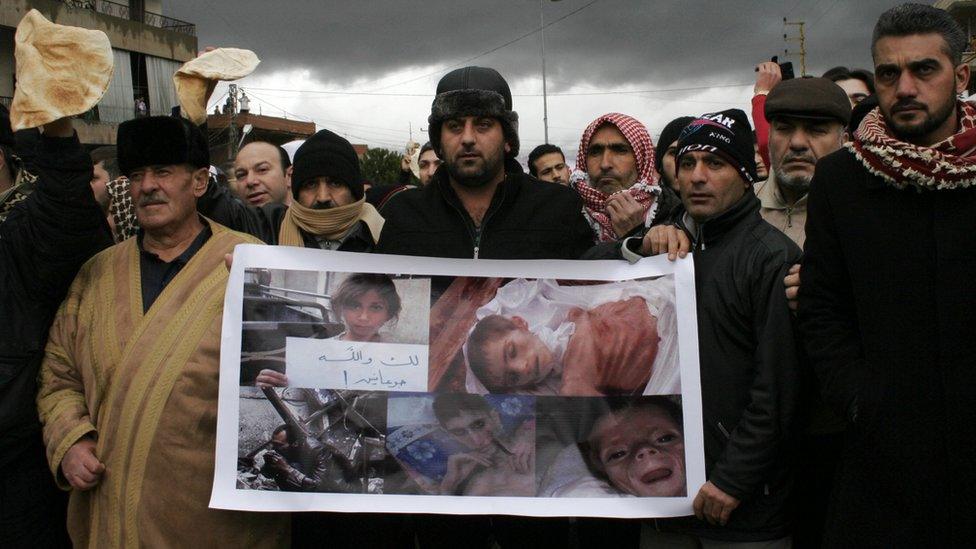
Protesters in January with pictures purported to show children of Madaya suffering from severe malnutrition
There was the case of Ali, he said, who had renal failure and was unable to go through dialysis because there was no equipment.
Aid workers said kidney problems had increased, as a result of malnutrition and their poor food intake. Siege Watch reported that two kidney failure patients died last month, and 27 other people with similar problems were trapped there.
There were also cancer patients, urinary infections, intestine diseases, Mr Darwish said, among others.
One day, he recalled, 13-year-old Hasan went to the clinic, with pain on his foot, which had some dark spots. "We couldn't give him anything because there were no drugs for him. I had no idea of what was wrong. He needed a specialist.
"We gave him painkillers. But painkillers can't treat. He had pain and was crying. He had so much pain that he couldn't walk. So I cried with him."
They had enough and, in November, closed the clinic.
"We were trying to do the best we could," he said. But, without supplies, they could not keep it going.
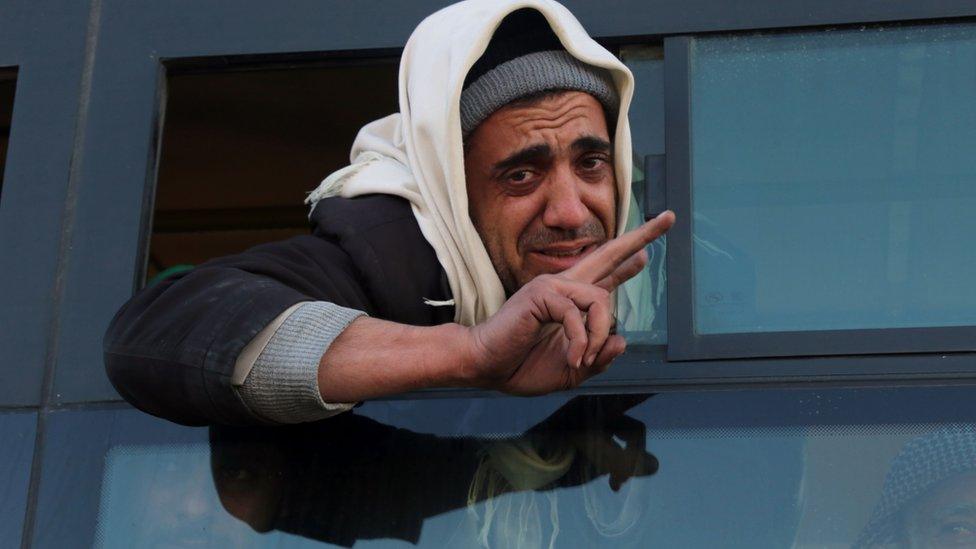
Evacuation of Madaya is said to be part of the plan that allowed the transfer of civilians and fighters from east Aleppo
It has been cold in Madaya. People have burnt shoes or furniture to keep them warm, as there is no electricity or fuel to run heaters. Unicef warned that the extreme weather was a big threat to children in the region.
Madaya and the nearby town of Zabadani, also under rebel control, have been included in the last stage of the truce that allowed the evacuation of rebel-held eastern Aleppo, and those with medical needs are expected to be brought out.
In exchange, residents besieged by rebels in government-controlled Foah and Kefraya, in Idlib province, will also be evacuated.
"We don't know what will happen, we don't know anything about our future. We hope that the siege will end. There are only civilians here," Mr Darwish said. "There is hope."
BBC Arabic's Hala Hindawi contributed to this report.